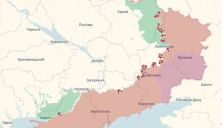Why has the U.S. failed to pressure Russia into ending its war against Ukraine? In this exclusive interview, political commentator and PhD in political science Jason Jay Smart breaks down the geopolitical failures of American policy, the global consequences of hateful negotiations, and the bizarre threats to annex Greenland as the 51st state of the USA, in an attempt to ramp up presence in the Arctic.
Tune in for expert insights into the shifting power dynamics and the challenges facing Ukraine and the world.
— I really like to discuss is the ongoing diplomatic crisis/chaos, considering the Greenland visit of JD Vance and the diplomatic collision between Denmark and the United States. What can you say about that notorious visit to the military base with much criticism towards the Kingdom of Denmark?
— Well, I think it shows just a total lack of understanding of what’s happening. I don’t know what JD Vance or Donald Trump thinks Greenland is. It’s not just, you know, the Antarctic, which is sort of up for grabs. I mean, obviously, Antarctica is something that there’s a lot of agreements on, but it’s not something that’s uninhabited. It’s part of Denmark, so it is sort of absurd to just imagine that they thought they could just come and by force or otherwise take it.
Now, at the same time, I don’t think that’s a real intention. I disagree with most people. I think the reality is Denmark is something the United States has no intention of starting a war with Denmark, and that would just be absurd. And there’s really no way to take Greenland by force. There’s an agreement the United States has had about having military bases on Greenland for decades and decades, so we could still use that body in order to continue having bases there to have more bases there.
I think the reality is that they’re trying to take away attention from other things, including the scandal with Signal with some of the senior people dealing with military strategy in the United States, national security.
They’re also trying to distract from other problems that they’re having, including the fact that these peace talks that they tried to organize with Russia are not working out as they hoped they would.
So, I think the reality here—and we’ll see this because Donald Trump did this during his first administration as well—whenever there’s something that’s not going well, they say, “Do things to distract attention,” and I think that’s really what this is about.
— Donald Trump has declared that he’s angry at Putin to NBC News because the peace talks seem to be stalled and Russia is not so keen to stop sending hundreds of drones each night against Ukrainian civilian infrastructure. But where’s the point why this peace initiative is not working as it should? So, of course, it is a rhetorical question. One side is not eager to do that.
— It’s quite clear Russia doesn’t want to have peace, and I think that everybody who understands the situation expected this outcome. Vladimir Putin at no point has expressed that he really wants to see this end. US intelligence, even last month and this month, was saying that it appears that Russia’s goal has not changed, which is to continue to pillage Ukraine and to overtake the country. And there shows no signs of slowing down.
So, I think it was just very misplaced and misguided to believe that somehow Donald Trump will be able to just go talk to Putin, and Putin would just change his objectives. There’s no reason to think that he’s going to change his objectives. He’s absolutely going to continue doing what he’s doing.
At this point, I think that Donald Trump is realizing and he’s becoming embarrassed by the fact that Putin doesn’t listen to him, that Putin is not going to just do what he wants, and so it’s going to be harder and harder for Donald Trump to continue saying that he’s going to create peace in Ukraine, and I think it’s becoming more and more obvious that’s just not an option.
— Some countries are really, really against any ceasefire talks in Ukraine. Those are the Baltics, and their ministries of defense have declared that a steel ceasefire or stallment of any military activity of Russia against Ukraine will free hundreds of thousands of Russian soldiers from the front, which can be used to attack the Baltics. And I’m really, really not that sure that the Baltics will be able to gather allied help soon enough to hold Russians back. So, it might be a tragic outcome with the already third occupation of the Baltic states in the last 100 years.
— The reality is I don’t think that Russia will try to overtake the Baltics at this stage. I don’t think that it’s something that they would exclude in the future, but at the present, I don’t think that that would be what they would want to do.
The fact is that Russia at this point, I think, learned a very painful lesson, which is that it’s extremely expensive, it’s extremely costly both in lives as well as money to try to take over a foreign country and to take the huge risk of instigating war with NATO countries, which could directly respond with troops.
That would just be too much risk. And ultimately, why I think that’s important is obviously Vladimir Putin doesn’t care about his own people. Obviously, he’s willing to take risks, and if he’s not punished for what’s happening in Ukraine, then absolutely I think there’s a very good chance that he will be more aggressive in the future. But at the same time, it’s much cheaper, much easier to manipulate countries. We see how that Russia has tried to steal elections.
Just recently in Romania, we saw the same in Georgia, we saw the same in Moldova. Russia has realized there’s ways you can operate within these democratic countries to try to manipulate the outcomes to the best interest of Russia. And I think that’s much cheaper and much easier for them to do than it is to physically try to take the territory of the Baltic states, especially at this point in time where the Russian military is very beat up.
— We kind of monitor the Russian intent to return to the world economy. They asked to release sanctions literally on each negotiation meeting. On the one hand, they’re saying that no sanctions are good for Russian economy, and on the other hand, they’re saying, “Well, let’s do business as we did it before.” That signals… yeah, like signal and signals about bad processes in the Russian economy at all. But still, I believe they have to shore them up. Because visually right now and at the front line, Russia is preparing new offensives against Ukraine.
— Absolutely the case. I mean, the reality is that Russia is taking advantage of the situation, and it’s doing it because the United States allowed them to do so, right? It’s really that simple. Donald Trump gave away a lot before negotiations began.
For reasons that I can’t really understand, Trump thinks that asserting that Ukraine will not join NATO, cutting off intelligence to Ukraine for a period of time, as well as arms, was somehow going to convince Russia to come along.
But it’s had the opposite effect. I mean, Russia interprets this as being weakness on the side of the United States. The United States has not committed, and that’s something that… and it’s ultimately sent jitters throughout Europe, something that all operates in Russia’s interest. And I think that it shows once again the catastrophic foreign policy of this administration.
It’s done a lot to shake up Europe, to upset our allies in Latin America and elsewhere. At the same time, our enemies, namely Russia, feel empowered by what’s going on. So, we can only hope that this will teach a lesson in the White House as well that operating this way is actually just worsening the situation for the United States globally, and in no means is it advancing American interests.
Read also: “I Believe Trump Really Wants to End This War” – William Taylor on UATV










